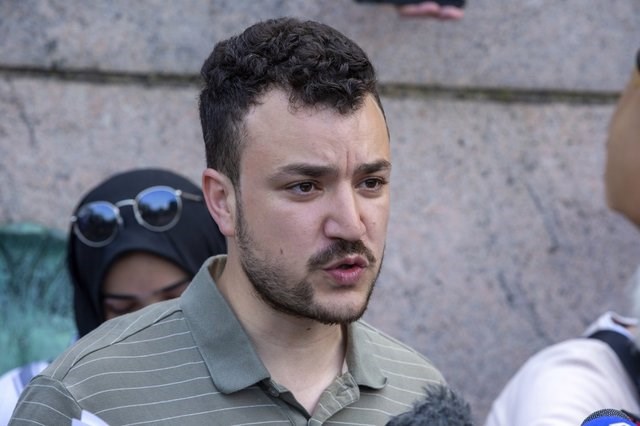
FILE - Student negotiator Mahmoud Khalil is seen at a pro-Palestinian protest encampment on the Columbia University campus in New York, April 29, 2024. (AP Photo/Ted Shaffrey, File)
Republished April 01, 2025 - 3:09 PM
Original Publication Date April 01, 2025 - 2:26 PM
NEW YORK (AP) — A federal judge has ruled that the legal battle over Mahmoud Khalil’s deportation should continue to play out in New Jersey, rejecting the Trump administration’s bid to transfer the Columbia University protester’s case to Louisiana.
In a written decision Tuesday, U.S. District Judge Michael Farbiarz in Newark said jurisdiction over the case should remain in New Jersey since Khalil was being held there at the time his lawyers filed their habeas corpus petition demanding his release.
“The Court’s jurisdiction is not defeated by the Petitioner having been moved to Louisiana,” the judge wrote, describing the government's argument otherwise as “unpersuasive.”
The ruling does not guarantee that Khalil will be moved out of a detention facility in Louisiana, where he is being held as the government seeks his deportation for his role in campus protests against Israel. But it will allow his attorneys to make their arguments for his release before a judge in New Jersey.
Khalil’s wife Noor Abdalla, an American citizen who is eight months pregnant, called the decision an “important step towards securing Mahmoud’s freedom,” adding that “there is still a lot more to be done.”
“As the countdown to our son’s birth begins and I inch closer and closer to my due date, I will continue to strongly advocate for Mahmoud’s freedom and for his safe return home,” she added.
Khalil, a legal U.S. resident, was detained by federal immigration agents on March 8 in the lobby of his university-owned apartment. It was the first arrest under President Donald Trump’s promised crackdown on students who joined campus protests against the war in Gaza.
On the day after his arrest, Khalil was flown to an immigration detention center in Jena, Louisiana, a move his lawyers allege was intended to manipulate federal jurisdiction of the case while depriving Khalil of access to his wife and children.
“They keep passing around the body in an almost Kafkaesque way,” defense attorney Baher Azmy said at a court hearing Friday in New Jersey.
The government’s argument for moving the case to Louisiana largely rested on what they described as a clerical error: by the time Khalil’s attorney’s had filed their habeas petition in New York for his release — at 4:40 a.m., the morning after his arrest — he already had been moved to a facility in New Jersey.
Transferring the case to Louisiana, Justice Department attorney August Flentje argued, was necessary “for jurisdictional certainty.”
The judge dismissed that argument in his ruling, writing that "at the moment the Petition was filed, there was only one such place — New Jersey, where the Petitioner was being held.
If the case were to go forward in Louisiana, it may have ultimately ended up before one of the nation’s most conservative appeals courts, possibly allowing those judges to issue a precedent-setting ruling on both Khalil’s case and the Trump administration’s broader efforts to deport noncitizen student activists.
News from © The Associated Press, 2025